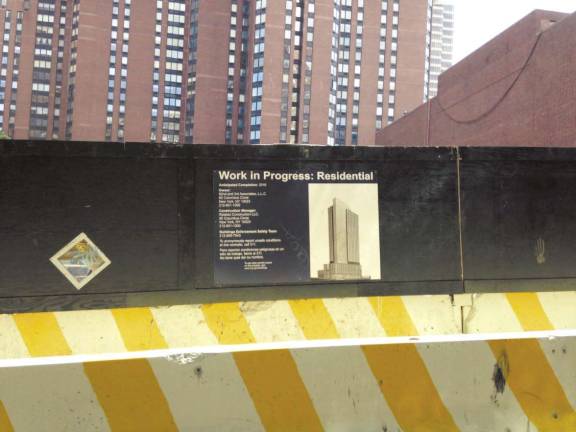The Noise that Never Sleeps

Residents living near the construction site of the former Ruppert Playground report unceasing noise
Upper East Side Sixty-seven and a half decibels is approximately the sound that a washing machine makes.
That is the sound level in George O'Connor's apartment at 225 East 93rd Street, but he doesn't have any appliances running. If O'Connor opens a window, the reading is 79.5 dB next to an open window. That is about the sound of highway traffic at 30 mph, but he doesn't live near a highway. Now, imagine hearing sound at these levels for close to 11 hours per day.
That is the noise stemming from construction occurring at 203 East 93rd Street, right across the street. Residents say that from 7:15 a.m. in the morning until 6 p.m. at night on weekdays, they hear the continuous noise of jackhammers. On weekends, construction begins at 9 a.m.
"I can't read, I can't watch television, I can't do anything because it's just so loud," O'Connor said.
Formerly the site of Ruppert Playground, a 36-story rental building is being built in its place. The lower eight floors will house commercial and retail space while the upper floors will host 320 residential apartments. Construction has been ongoing since early May, and O'Connor, who lives in an independent senior living center, is among the many residents who simply cannot escape the noise.
"We're not going to work. Yeah, you can leave your apartment for one or two hours, but you can't just keep leaving," O'Connor said. "You know, this is a senior living center; you can't live like this."
"This continuous sound is disrupting the activities of the person at home," explained environmental psychologist and noise expert Arline Bronzaft, Ph.D., City University of New York.
"As far as these people are concerned, these people are entitled to lead good lives in their homes, and they can't."
Going outside can lead to encountering even higher levels of noise for these residents. On a sixth floor balcony at O'Connor's apartment building, sound levels reached as high as 93.2 dB. That is 20 decibels lower than a clap of thunder.
O'Connor contacted the Department of Environmental Protection three times in June alone to complain about the noise, but to no avail.
After several unsuccessful attempts, O'Connor contacted City Councilman Ben Kallos' office, which issued a complaint to the Department of Environmental Protection, which handles outdoor noise issues, on behalf of the Upper East Side residents.
When a DEP Inspector visited the site, they indeed found that the plan was not compliant with noise mitigation standards. The site has approximately 15 days to make the plan compliant, or else they will be issued a violation and will have to appear in court.
"We will continue to follow up with the constituent and the site continuously," said Sarah Anders, communications director for Kallos' office.
Noise is New York City's biggest quality of life complaint with about 300,000 calls every year to 311, and not without due cause. Studies have shown that people with chronic exposure to noisy neighborhoods can lead to an onset of health problems such as high blood pressure.
"The noise is unwanted, uncontrollable, and affecting health and health is necessary for a decent quality of life," said Bronzaft.
Controlling noise has been a problem for many years. Council Members Daniel Garodnick and Rosie Mendez, along with former Council Member and current Manhattan Borough President Gale Brewer, have been in the process of championing a bill that would not only reduce construction hours, but also eliminate loopholes that allow contractors to hold permits that allow round-the-clock construction.
If the law passes, contractors would be forbidden from working before 7 a.m. and after 8 p.m. on weekdays and before 11 a.m. and after 4 p.m. on Saturdays.
Construction for the building is slated for completion in December 2016. O'Connor, however, explains that this date is only if every aspect of construction runs smoothly, and thinks that a more realistic date is summer 2017.
Bronzaft believes that residents like O'Connor should not have to simply cope with the noise. "The problem is that people are getting 'used to the noise.' And getting 'used to it' just means the body is adapting," she says. "You're using energy to cope and coping is always at an expense."
Construction developer, Related Companies, did not reply to a request for comment.
Do you have problems with construction noise in your neighborhood? We want to hear your story. Email news@strausnews.com.